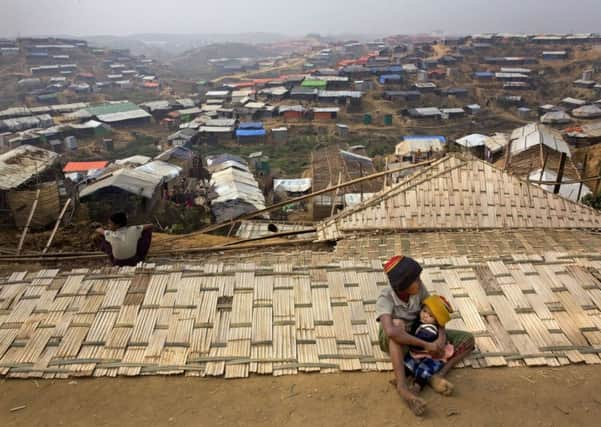Dire relief crisis set to get worse


The UN has described the crackdown against the Rohingya people that prompted this mass exodus as a “textbook example of ethnic cleansing” – however Burmese authorities deny this charge, arguing that their actions have been in response to attacks by militants in Rakhine State.
As part of a European Parliament delegation I visited two of the refugee settlements in late February.
Advertisement
Hide AdAdvertisement
Hide AdWe were briefed by Bangladesh government officials who administer services in the region. plus representatives from the various UN agencies and international non-governmental agencies involved in delivering humanitarian assistance. Most importantly we met with Rohingya families to hear their accounts of the situation first-hand and to discuss both their immediate and longer term needs.


Although I was aware of the scale of the unfolding refugee crisis through media reports and other briefings, these did little to prepare me for actually witnessing the conditions in the camps or for meeting with those affected.
Refugees arrive with few possessions, malnourished, dehydrated, and often in need of urgent medical attention.
Bulldozers and diggers are working round the clock to clear enough land to accommodate shelters for the new arrivals.
Advertisement
Hide AdAdvertisement
Hide AdTeams of dedicated and professional aid workers are working in extremely difficult conditions providing; food, safe drinking water, emergency latrines, medical care and shelter.


UNICEF estimates that children make up around 60% of the refugee population and there is a concern many of them are vulnerable to abuse, including exploitation by people traffickers.
The refugees themselves are actively involved in building camp infrastructure; for example, being employed to improve drainage or to construct bamboo bridges which aid movement around the hilly terrain – so-called ‘cash-for-work’ programmes.
As bad as the situation is at present, conditions in the camps – which together are now home to over one million refugees – are only expected to deteriorate further in coming weeks.
Advertisement
Hide AdAdvertisement
Hide AdOfficials outlined to us how the money ($434m dollars) pledged by the international community to support the relief effort is unlikely to last beyond April.
Many of the flimsy shelters currently clinging to the hillsides must be either reinforced or relocated to avoid being destroyed by landslides and flooding when heavy seasonal monsoon rains arrive next month. The risk of landslides has been increased further by the removal of vegetation for firewood.
There is clearly a case for continued assistance to address the immediate needs of the refugees in Bangladesh and the UK is a leading contributor. A sustained diplomatic effort is needed if a long-term solution that addresses the complex root causes of this humanitarian crisis is to be found.
It is the case that the Bangladesh and Burmese governments have signed an agreement to allow the repatriation of refugees. This deal has however yet to be implemented as the Rohingya people have concerns about conditions in Rakhine – concerns shared by many in the international community, including the UK government.
Advertisement
Hide AdAdvertisement
Hide AdMembers of the Rohingya community made it clear to me that whilst they wish to return home they will only do so when their safety can be guaranteed.
The Burmese authorities must therefore co-operate fully with the UN to ensure that the displaced Rohingya can voluntarily and safely return home when conditions are right.
Jim Nicholson, UUP MEP and vice-chair of the European Parliament’s Delegation for Relations with the Countries of South Asia